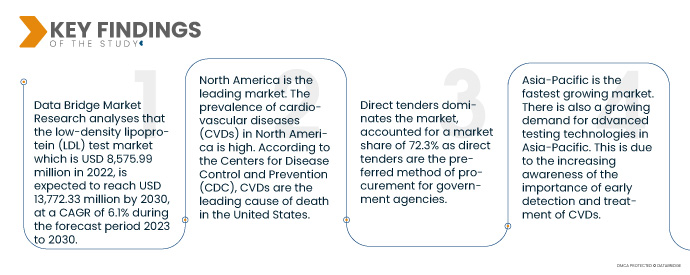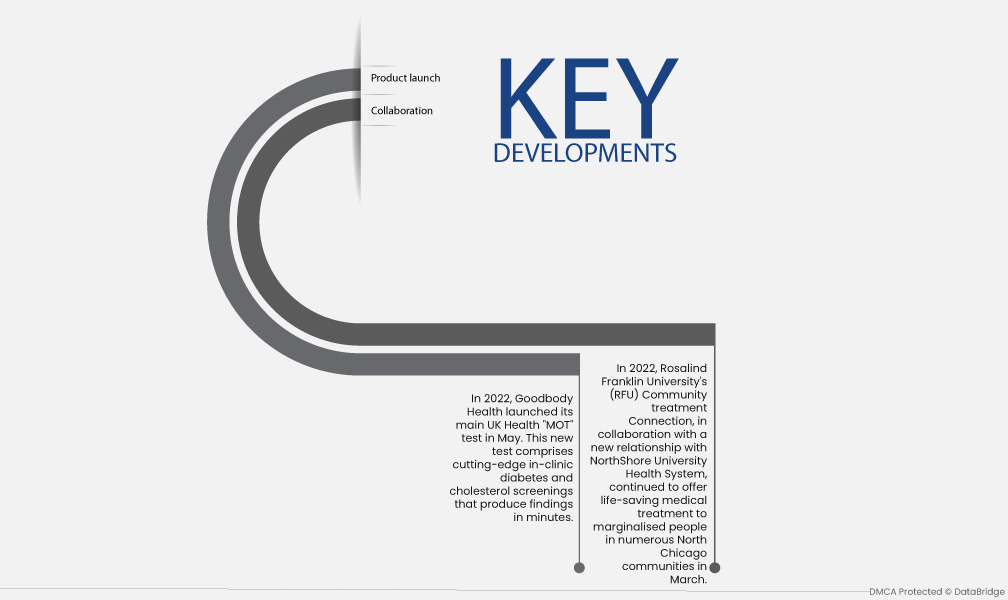Согласно исследованию, проведенному в ноябре 2020 года под названием «Липидный профиль у индийских пациентов с диабетом 2 типа: возможности снижения риска атеросклеротических сердечно-сосудистых заболеваний», у 40,0% лиц была гиперлипидемия, а у 14,6% она была только что диагностирована. Повышенный уровень холестерина ЛПНП был наиболее распространенным нарушением липидного обмена, и было обнаружено, что уровень холестерина ЛПНП связан с более высоким уровнем A1C и уровнями глюкозы в крови натощак. Аналогичным образом, согласно обновлению Центров по контролю и профилактике заболеваний за июль 2022 года, общий уровень холестерина примерно у 94 миллионов американцев в возрасте 20 лет и старше превышает 200 мг/дл, а взрослых в Соединенных Штатах с общим уровнем холестерина более 240 мг/дл насчитывается 28 миллионов.
Полный отчет доступен по адресу https://databridgemarketresearch.com/reports/global-ldl-test-market
Data Bridge Market Research анализирует, что рынок тестов на липопротеины низкой плотности (ЛПНП), который в 2022 году составил 8 575,99 млн долларов США, как ожидается, достигнет 13 772,33 млн долларов США к 2030 году при среднегодовом темпе роста 6,1% в прогнозируемый период с 2023 по 2030 год. Сердечно-сосудистые заболевания (ССЗ) являются основной причиной смерти во всем мире. Холестерин ЛПНП является основным фактором риска сердечно-сосудистых заболеваний, поэтому растущая распространенность сердечно-сосудистых заболеваний стимулирует спрос на тесты на ЛПНП. Тестирование в месте оказания медицинской помощи (POCT) — это тип тестирования, который проводится у постели пациента или в кабинете врача. POCT становится все более популярным, поскольку он удобнее и быстрее традиционного лабораторного тестирования. Разрабатывается ряд новых и передовых технологий тестирования ЛПНП. Эти технологии предлагают ряд преимуществ по сравнению с традиционными методами тестирования ЛПНП, например, они более точны и быстры.
Ожидается , что растущая распространенность заболеваний сердца будет способствовать темпам роста рынка.
Растущая распространенность хронических и сердечно-сосудистых заболеваний может замедлить темпы расширения рынка тестов на липопротеины низкой плотности (ЛПНП). Высокий уровень холестерина способствовал увеличению распространенности сердечных заболеваний, таких как гипертония, стенокардия, инсульт, заболевание сонной артерии и заболевание периферических артерий. Высокий уровень холестерина вызывает гипертонию, которая является всемирной проблемой. Диабет повышает уровень плохого холестерина и триглицеридов, одновременно снижая уровень хорошего холестерина, увеличивая риск инсульта и заболеваний сердца. Это конкретные аспекты, которые влияют на расширение рынка.
Область отчета и сегментация рынка
Отчет Метрика
|
Подробности
|
Прогнозируемый период
|
2023-2030
|
Базовый год
|
2022
|
Исторические годы
|
2021 (можно настроить на 2015-2020)
|
Количественные единицы
|
Доход в млн. долл. США, объемы в единицах, цены в долл. США
|
Охваченные сегменты
|
Тип (ЛПНП-Х, ЛПНП-П, ЛПНП-Б, другие), Компонент (Наборы и реагенты, Устройства, Услуги), Заболевание (Диабет, Инсульт, Атеросклероз, Ожирение, Дислипидемия, Заболевание сонной артерии, Заболевание периферических артерий , Стенокардия, другие), Канал сбыта (Прямые тендеры, Розничная торговля), Конечный пользователь (Больницы, Клиники, Амбулаторная помощь, Исследовательская лаборатория, другие)
|
Страны, охваченные
|
США, Канада и Мексика в Северной Америке, Германия, Франция, Великобритания, Нидерланды, Швейцария, Бельгия, Россия, Италия, Испания, Турция, Остальная Европа в Европе, Китай, Япония, Индия, Южная Корея, Сингапур, Малайзия, Австралия, Таиланд, Индонезия, Филиппины, Остальная часть Азиатско-Тихоокеанского региона (APAC) в Азиатско-Тихоокеанском регионе (APAC), Саудовская Аравия, ОАЭ, Южная Африка, Египет, Израиль, Остальной Ближний Восток и Африка (MEA) как часть Ближнего Востока и Африки (MEA), Бразилия, Аргентина и Остальная часть Южной Америки как часть Южной Америки
|
Охваченные участники рынка
|
Thermo Fisher Scientific Inc. (США), BD (США), Abbott (США), QIAGEN (Германия), Quest Diagnostics Incorporated (США), Sekisui Diagnostics (США), Express Biotech International (США), F. Hoffmann-La Roche Ltd. (Швейцария), Randox Laboratories Ltd. (Англия), Diasys Diagnostic Systems GmbH (Германия), Reckondiagnostics (Индия), Eurolyser Diagnostica GmbH (Австрия), Diazyme Laboratories, Inc. (Германия), Laboratory Corporation of America Holdings. (США), Cell Biolabs, Inc. (США), Atlas Medical GmbH (Великобритания), Eurofins Scientific (Люксембург), Home Access Health (США), Clinical Reference Laboratory, Inc. (США), Merck KGaA (Германия)
|
Данные, отраженные в отчете
|
Помимо таких рыночных данных, как рыночная стоимость, темпы роста, сегменты рынка, географический охват, участники рынка и рыночный сценарий, рыночный отчет, подготовленный командой Data Bridge Market Research, включает в себя углубленный экспертный анализ, эпидемиологию пациентов, анализ воронки продаж, анализ цен и нормативную базу.
|
Анализ сегмента:
Рынок тестов на липопротеины низкой плотности (ЛПНП) сегментирован по типу, компоненту, заболеванию, каналу сбыта и конечному пользователю.
- По типу рынок сегментируется на ЛПНП-Х, ЛПНП-П, ЛПНП-Б и другие.
Ожидается, что сегмент ЛПНП-Х будет доминировать на мировом рынке тестов на липопротеины низкой плотности (ЛПНП)
Сегмент ЛПНП-Х является крупнейшим сегментом на рынке тестов ЛПНП, на его долю приходится 67,2% рынка. Это связано с тем, что ЛПНП-Х является наиболее известным типом теста ЛПНП и чаще всего используется для оценки риска сердечных заболеваний.
- По компоненту рынок сегментирован на наборы и реагенты, устройства, услуги. Наборы и реагенты доминируют на рынке, составляя 58,3% доли рынка. Во-первых, они являются наиболее важными компонентами тестирования ЛПНП. Во-вторых, они относительно доступны по цене и просты в использовании. В-третьих, существует широкий ассортимент наборов и реагентов от разных производителей, что дает поставщикам медицинских услуг большую гибкость в выборе правильного продукта для своих нужд.
- На основе заболевания рынок сегментирован на диабет, инсульт, атеросклероз, ожирение, дислипидемию, заболевание сонной артерии, заболевание периферических артерий, стенокардию и другие. Сегмент, который доминирует на рынке тестов ЛПНП на основе заболевания, — это атеросклероз. Этот сегмент занял долю рынка в 36,2%. Есть несколько причин, по которым атеросклероз доминирует на рынке. Во-первых, атеросклероз является основным фактором риска сердечно-сосудистых заболеваний. Во-вторых, холестерин ЛПНП является основным фактором, способствующим развитию атеросклероза.
- По каналу сбыта рынок сегментирован на прямой тендер, розничные продажи. Прямые тендеры доминируют на рынке, составляя 72,3% доли рынка, поскольку прямые тендеры являются предпочтительным методом закупок для государственных учреждений и крупных организаций здравоохранения.
- В зависимости от конечного пользователя рынок сегментируется на больницы, клиники, амбулаторные учреждения, научно-исследовательские лаборатории и другие.
Ожидается, что сегмент больниц будет доминировать на мировом рынке тестов на липопротеины низкой плотности (ЛПНП)
Больничный сегмент доминирует на рынке, занимая долю рынка в 48,1%, поскольку больницы являются основным местом диагностики и лечения сердечно-сосудистых заболеваний.
Основные игроки
Data Bridge Market Research признает следующие компании основными игроками рынка: Thermo Fisher Scientific Inc. (США), BD (США), Abbott (США), QIAGEN (Германия), Quest Diagnostics Incorporated (США), Sekisui Diagnostics (США), Express Biotech International (США), F. Hoffmann-La Roche Ltd. (Швейцария), Randox Laboratories Ltd. (Англия), Diasys Diagnostic Systems GmbH (Германия), Reckondiagnostics (Индия), Eurolyser Diagnostica GmbH (Австрия), Diazyme Laboratories, Inc. (Германия), Laboratory Corporation of America Holdings. (США), Cell Biolabs, Inc. (США), Atlas Medical GmbH (Великобритания), Eurofins Scientific (Люксембург), Home Access Health (США), Clinical Reference Laboratory, Inc. (США), Merck KGaA (Германия).
Развитие рынка
- В 2022 году Goodbody Health запустила свой главный тест UK Health "MOT" в мае. Этот новый тест включает в себя передовые внутриклинические скрининги диабета и холестерина, которые дают результаты за считанные минуты. Эти тесты оценивают риск человека заболеть сердечными заболеваниями или диабетом в течение следующих десяти лет.
- В 2022 году в марте организация Rosalind Franklin University (RFU) Community Treatment Connection в сотрудничестве с новой системой здравоохранения NorthShore University продолжила предлагать жизненно важную медицинскую помощь маргинализированным людям в многочисленных общинах Северного Чикаго. Care Coach, мобильное медицинское подразделение, укомплектованное лицензированными специалистами в области здравоохранения, получит прямое финансирование из Community Investment Fund (CIF) NorthShore в размере 680 000 долларов. Контроль артериального давления, скрининг диабета, ИМТ, тестирование на холестерин и другие дополнительные методы лечения доступны через мобильное подразделение.
Региональный анализ
Географически в отчете о рынке рассматриваются следующие страны: США, Канада и Мексика в Северной Америке, Германия, Франция, Великобритания, Нидерланды, Швейцария, Бельгия, Россия, Италия, Испания, Турция, остальные страны Европы в Европе, Китай, Япония, Индия, Южная Корея, Сингапур, Малайзия, Австралия, Таиланд, Индонезия, Филиппины, остальные страны Азиатско-Тихоокеанского региона (APAC) в Азиатско-Тихоокеанском регионе (APAC), Саудовская Аравия, ОАЭ, Южная Африка, Египет, Израиль, остальные страны Ближнего Востока и Африки (MEA) как часть Ближнего Востока и Африки (MEA), Бразилия, Аргентина и остальные страны Южной Америки как часть Южной Америки.
Согласно анализу Data Bridge Market Research:
Северная Америка будет доминирующим регионом на рынке тестов на липопротеины низкой плотности (ЛПНП) в прогнозируемый период 2023–2030 гг.
Северная Америка является ведущим рынком. Распространенность сердечно-сосудистых заболеваний (ССЗ) в Северной Америке высока. По данным Центров по контролю и профилактике заболеваний (CDC), ССЗ являются основной причиной смерти в Соединенных Штатах, составляя одну из четырех смертей. В Северной Америке также растет спрос на тестирование в месте оказания медицинской помощи (POCT).
По оценкам, Азиатско-Тихоокеанский регион станет самым быстрорастущим регионом на рынке тестов на липопротеины низкой плотности (ЛПНП) в прогнозируемый период 2023–2030 гг.
Азиатско-Тихоокеанский регион является самым быстрорастущим рынком. В Азиатско-Тихоокеанском регионе также растет спрос на передовые технологии тестирования. Это связано с растущим пониманием важности раннего выявления и лечения сердечно-сосудистых заболеваний.
Для получения более подробной информации об отчете о рынке тестов на липопротеины низкой плотности (ЛПНП) нажмите здесь – https://www.databridgemarketresearch.com/reports/global-ldl-test-market













